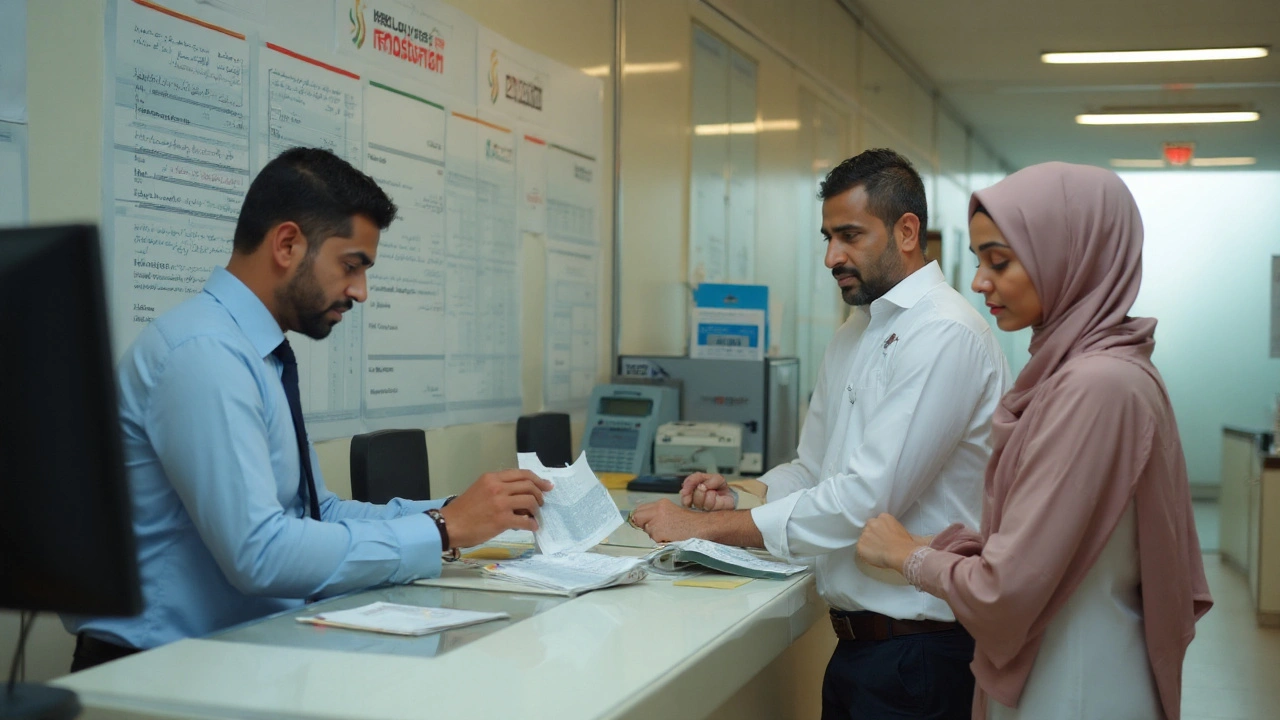Is Rent in Dubai Monthly? 2025 Guide to Cheques, Ejari, Deposits, and Payment Plans
 Sep, 4 2025
Sep, 4 2025
You’re probably used to paying rent every month. Dubai does it differently. Here, most long-term rentals are yearly contracts and paid in “cheques” (installments), but monthly is possible if you negotiate, pick the right building, or choose serviced/holiday homes. I’ll show you how payments really work in 2025, what’s negotiable, and the exact costs to plan for so there are no gotchas on move-in day.
- Most standard leases in Dubai are annual, paid in 1, 2, 4, or 12 post‑dated cheques. Monthly is common in serviced apartments and increasingly offered by corporate landlords.
- Security deposit is typically 5% (unfurnished) or 10% (furnished). Agency fee ~5% of annual rent. Ejari registration is mandatory (Dubai Land Department/RERA).
- More cheques = easier cash flow but sometimes a slightly higher annual rent than a 1‑cheque deal.
- Short stays (hotel/serviced apartments) are flexible but can include 5% VAT and a tourism fee; annual residences are generally VAT‑exempt.
- If a landlord refuses 12 cheques, target communities with corporate management, or pivot to serviced/holiday homes for true monthly payments.
How rent actually gets paid in Dubai (2025)
So, is rent in Dubai monthly? For classic one‑year leases, rent is quoted per year (AED/year), and you pay using post‑dated cheques-often 1, 2, 4, or 12. Think of cheques as scheduled instalments locked in the contract. Each cheque has a date, and the landlord deposits them on those dates. Monthly exists, but it’s not the default; it depends on the landlord, the building, and your negotiation.
Who sets the rules? Residential tenancy in Dubai is regulated by the Dubai Land Department (DLD) and RERA. The key pieces: Law No. 26 of 2007 (and Law No. 33 of 2008 amendment) govern landlord‑tenant relations; Ejari registration is mandatory for any tenancy contract; rent increase caps follow the RERA Rental Index and related decrees; eviction for personal use or sale requires a 12‑month written notice served via notary public or registered mail. This framework hasn’t changed in spirit as of September 2025, even as digital payments become more common.
Payment methods you’ll actually see:
- Post‑dated cheques: Still the norm. Many landlords prefer fewer cheques (1-4) and may offer a better rate if you accept that.
- 12 cheques/monthly: Growing, especially with corporate landlords and property managers. Sometimes a small premium for the flexibility.
- Bank transfer/direct debit: Increasingly accepted, particularly in newer buildings or through property‑management portals. The contract will still state instalment dates.
- Serviced/hotel apartments: True monthly billing, credit card or bank transfer. Usually pricier, includes utilities and housekeeping, and may attract 5% VAT plus a Tourism Dirham fee.
Standard extra costs to budget for:
- Security deposit: Typically 5% of annual rent for unfurnished, 10% for furnished. Refundable, minus damages.
- Agency fee: Commonly 5% of annual rent (sometimes a flat fee for lower rents).
- Ejari registration: Payable on registration with the DLD (tenancy must be registered; your utilities, visas, and family sponsorship often depend on Ejari).
- DEWA (electricity/water) deposit: Usually AED 2,000 for apartments and AED 4,000 for villas, plus activation fees. If the building is “chiller‑free,” AC is included; if not, budget cooling bills separately.
- Move‑in permits/fees: Many buildings require a move‑in permit and refundable elevator deposit.
Why some rents are cheaper with fewer cheques: Landlords like lower risk and administrative hassle. Paying in 1 cheque can win you a discount. Spreading over 12 cheques smooths your cash flow but can bump the total annual rent a bit. The difference varies by building and market conditions.
| Payment plan | What it means | Typical who/where | Price effect |
|---|---|---|---|
| 1 cheque (annual) | One lump‑sum cheque at contract start | Private landlords; older buildings | Often cheapest annual price |
| 2 cheques | 50/50 split across the year | Common compromise | Usually close to lowest rate |
| 4 cheques | Quarterly payments | Very common across Dubai | Standard pricing |
| 12 cheques | Monthly instalments | Corporate landlords; new builds | Small premium in many cases |
| Serviced/hotel apt (monthly) | Monthly billing, utilities included | Hotel brands, managed residences | Highest, adds VAT/tourism fees |
About bounced cheques and late payments: The UAE eased criminal penalties for bounced cheques in recent years, but they’re not a free pass. You can face fines and civil claims. Treat instalment dates as firm. If cash flow is tight, negotiate 12 cheques upfront instead of hoping to “figure it out later.”
Rent increases and renewal: Landlords can only raise rent within the RERA Rental Index limits and notice rules (typically 90 days’ notice before contract end if terms change). If you suspect an increase is above the cap, you can calculate allowable increases using RERA’s index or escalate through the Rental Disputes Center.

How to get monthly rent (or close) in Dubai
If you want true monthly, you’ve got three practical paths: negotiate 12 cheques on a standard lease, pick a building where 12 cheques is normal, or choose serviced/holiday homes. Here’s how to do each without wasting viewings.
- Filter smartly before viewing: Search portals and agent ads for “12 cheques,” “monthly,” or “corporate landlord.” Newer communities and institutional owners are more likely to offer 12 cheques.
- Show you’re solid: Have documents ready-passport, visa or entry permit, Emirates ID (or application slip), proof of income (salary certificate or bank statements), and a reference if you have one. Strong profiles get flexible terms.
- Ask the right way: When you call, lead with your preference: “Is the landlord open to 12 cheques if the offered price stands?” If they hesitate, ask if an extra 2-3% would secure 12 cheques. This is often what tips the scale.
- Use serviced/hotel apartments if you need total flexibility: True monthly, furnished, utilities included, quick move‑in. Expect 5% VAT and a Tourism Dirham fee per room per night. Great for the first 1-3 months while you sort documents and scout neighborhoods.
- Consider hybrid savings: Do 3 months in a serviced apartment (monthly), then move to a 1‑cheque annual lease for a lower annual rate once your Emirates ID and chequebook are set.
Key trade‑offs:
- 12 cheques vs 4 cheques: Monthly eases cash flow and risk if you might relocate. 4 cheques usually nets a slightly better total price.
- Serviced monthly vs annual lease: Serviced is turnkey (furniture, bills, cleaning) but carries VAT and higher rates. Annual leases are cheaper long‑term but need deposits, cheques, and setup time.
- Corporate vs private landlords: Corporate management tends to standardize 12 cheques and online payments. Private owners can be faster to negotiate discounts for 1-4 cheques.
Numbers that make this real. Say the listing shows AED 120,000/year for a two‑bed in a mid‑market tower. Three common scenarios:
| Scenario | Instalments | Expected annual rent | Cash flow pattern |
|---|---|---|---|
| Discounted lump sum | 1 cheque | AED 116,000-118,000 (often negotiable down) | One large payment now |
| Standard plan | 4 cheques | AED 120,000 | AED 30,000 quarterly |
| Monthly convenience | 12 cheques | AED 121,000-124,000 (modest premium) | ~AED 10,100-10,333 monthly |
Now factor in move‑in costs for that AED 120,000 unit (unfurnished):
- Security deposit (5%): AED 6,000
- Agency fee (5%): AED 6,000
- Ejari: typical government fee payable on registration
- DEWA deposit (apartment): typically AED 2,000 plus activation
- Move‑in/elevator deposit: varies by building; often refundable
First month under 12 cheques might look like: AED 10,000-10,333 rent + AED 6,000 deposit + AED 6,000 agency + DEWA deposit and fees + Ejari + any building deposits. That’s why many people start in a serviced apartment for a month, then switch once documents are sorted.
How to pay without a chequebook yet: Banks issue chequebooks once you have a resident account. If you’re new and don’t have one, ask the agent about bank transfers to the landlord, or see if the property manager offers a payment link or direct debit. Some landlords will accept 3-12 bank transfers scheduled in the contract in place of physical cheques.
What about leaving early? UAE law doesn’t give tenants an automatic early‑termination right on standard leases. Most contracts add a break clause (often 60-90 days’ notice plus a 1-2‑month penalty). If flexibility matters, negotiate that clause upfront or choose serviced monthly housing.
Can the landlord raise rent mid‑lease? No. The rent is fixed during the contract term. Changes (including increases) apply on renewal and must follow the RERA Rental Index and notice timelines.

Checklists, FAQs, and next steps
Here’s a bundle you can save and use when you’re ready to sign.
Quick budget checklist (annual lease):
- Annual rent and payment plan (1/2/4/12 cheques). Ask if 12 cheques adds a premium and how much.
- Security deposit: 5% unfurnished, 10% furnished.
- Agency fee: Typically 5% of annual rent.
- Ejari cost (mandatory for utilities, visa, etc.).
- DEWA deposit and activation; is AC “chiller‑free” or not?
- Move‑in permit and elevator deposit.
- Any parking or facility access fees.
- Early termination clause and penalties.
Documents you’ll usually need:
- Passport and UAE visa (or entry permit if new) and Emirates ID (or application slip).
- Salary certificate or employment contract; freelancers may use bank statements and trade license.
- Post‑dated cheques or agreed bank‑transfer schedule.
- Title deed/ownership details from the landlord (your agent will handle verification).
Mini‑FAQ
- Can I pay monthly without cheques? Increasingly yes, via transfers or direct debit, especially with corporate landlords. The contract will still show 12 instalments.
- Is Ejari mandatory if I’m paying monthly? Yes. If it’s a long‑term tenancy (not a hotel/short‑stay), Ejari is required under DLD/RERA rules.
- Do short‑term and serviced apartments charge VAT? Yes-residential hotel/serviced stays are typically subject to 5% VAT and a Tourism Dirham fee. Annual residential leases are generally VAT‑exempt.
- When can my rent increase? Only at renewal and within RERA Rental Index caps, with proper notice (usually 90 days before contract end if terms change).
- What if a cheque bounces? Expect bank charges and possible fines or civil action. Contact the landlord immediately to resolve and avoid escalation.
- Can I sublet or do Airbnb? Only if your contract allows and local licensing rules are followed. Unauthorized subletting can trigger eviction under RERA rules.
- Is 12 months’ eviction notice still required? Yes-if the landlord wants the unit for personal use or sale, they must provide a 12‑month notice via notary public or registered mail.
Heuristics and pro tips:
- Price vs cheques rule‑of‑thumb: 1 cheque often buys you the best rate. 4 cheques is standard. 12 cheques may add a small premium-but not always. Ask for both numbers and compare the total.
- Corporate landlords = smoother monthly: If monthly matters, target professionally managed towers. You’ll get online portals, card payments, and predictable processes.
- Time your move: Inventory loosens in summer; negotiations can be easier. In peak season, be ready with documents and a deposit to lock terms fast.
- Always get promises in the contract: If the agent says “12 cheques is fine,” make sure the schedule and amounts are written into the lease and Ejari.
- Check RERA calculator before renewing: If the proposed increase looks high, verify against the official index and push back if needed.
Next steps by situation
- New arrival (no chequebook yet): Book a serviced apartment monthly for 1-2 months; open a bank account; get Emirates ID; then sign an annual lease with 12 cheques or transfers.
- On a tight budget: Aim for 1-4 cheques to lower the annual price. Ask for a rent‑free period (one or two weeks) instead of a rate cut if the landlord resists.
- Short‑term project (2-6 months): Choose serviced/holiday homes for true monthly payments. Confirm VAT and all‑in pricing to avoid surprises.
- Family with school deadlines: Prioritize stability-go for 4 cheques, strong break clause, and a building with responsive management. The small premium for 12 cheques may be worth your cash flow.
Troubleshooting
- Landlord refuses 12 cheques: Offer a small premium or a higher security deposit cap (still refundable), or switch to a corporate‑managed building where 12 cheques is standard.
- Ejari delays: Make sure the landlord/agent submits promptly with all documents. Without Ejari, you can’t set up visas or some utilities.
- Unexpected utility bills: Confirm if AC is chiller‑free. Ask for recent DEWA and cooling bills from a previous tenant as a guide.
- Rent increase dispute: Reference the RERA Rental Index and notice periods. If talks stall, the Rental Disputes Center is the escalation path.
- Early exit mid‑lease: Check your break clause. If none, negotiate-offering help to find a replacement tenant often reduces penalties.
Credibility check: The rules cited come from the Dubai Land Department and RERA framework (Law No. 26 of 2007 and Law No. 33 of 2008), Ejari requirements set by DLD, rent cap guidance based on the RERA Rental Index, and eviction notice rules that require 12 months served via notary public/registered mail. For money decisions, always verify the latest fees directly with the DLD and your building’s management, since admin fees can change.
Bottom line: Dubai doesn’t force you into one payment style. Annual leases with instalments are the norm, but you can get monthly if you plan it-negotiate 12 cheques, choose the right landlord, or go serviced if you want plug‑and‑play flexibility.
Dubai Escort